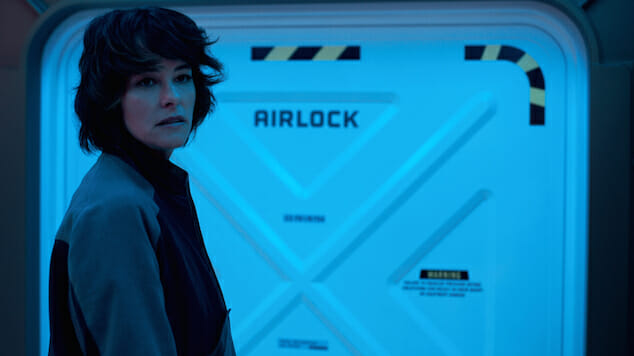In Praise of the Two Note-Perfect Parkers of Netflix’s Lost in Space
Photo: Courtesy of Netflix
“Infestation,” the third episode of Netflix’s new Lost in Space, sets up the series’ most promising contrast—not among members of the Robinson family, waylaid on a distant “Goldilocks planet” after a colonizing mission goes terribly awry, or even between the Robinsons and the alien life forms they encounter, including the protective robot that murmurs “Danger, Will Robinson” every time his young charge (played by Maxwell Jenkins) runs into trouble. No, it’s the near-magnetic polarization the arises when Maureen Robinson (Molly Parker)—straightforward, rational, occasionally stiff—meets “Dr.” Smith (Parker Posey)—slippery, opportunistic, strangely insightful—though the former doesn’t yet know the latter’s an imposter. Still, the episode’s key moment finds Smith, despite being so thoroughly self-serving, throw in with her counterpart: As she explains to Will earlier in the episode, “Every day we have these little battles going on inside of us. Between what we want to do and what we need to do. And sometimes they can be very different things.”
As the emblem of those battles, Lost in Space’s two Parkers, Molly and Posey, generate much the same excitement as the series’ (many, mostly effective) action sequences. Its motor isn’t the force of the soldier, as represented by Toby Stephens’ gruff John Robinson, but the logic of the scientist, the guile of the con woman, the problem-solving acumen of Will and his older sisters, Penny (Mina Sundwall) and Judy (Taylor Russell). From using magnesium to melt ice and commandeering a “chariot”—a cross between a Jeep and a tank—to determining the cause of engine distress, the Robinsons are at their best untangling dilemmas, rather than blasting through them. At one point, facing a more complicated calculation than she expected, Maureen quips, “I’m gonna need a bigger whiteboard,” and it resounds as Lost in Space’s central proposition: That there’s room in the genre, and indeed on television, for the “science” in science fiction to be more than the expression of humankind’s worst instincts.
In fact, though it’s been (not unreasonably) described as “darker” than Irwin Allen’s original, which aired on CBS from 1965 to 1968, the most important changes in Netflix’s remake—Parker’s top billing, Posey’s casting—reflect more depth than darkness, at least not darkness for its own sake. The series premiere aside, Maureen is John’s equal, if not, at times, the dominant figure in their relationship, one that turns out to be much thornier than it might seem. (“I think it’s important that they all hear us speaking with one voice,” she says of the children. “That voice is mine.”) Coupled with Posey’s superb Dr. Smith—replacing Jonathan Harris’ notoriously hammy original with a conniving, multilayered figure, one whose high-piled shock of hair and near-vacant expression suggest weakness, but in fact hide her true strength—Maureen’s calm, pragmatic approach to crises underscores the series’ admirable reluctance to confuse “violence” for “suspense,” or for that matter “adventure.”
This not only means that Lost in Space is genuinely fit for family viewing—off the top of my head, I can’t think of a current TV drama better suited to adolescents and their parents, not least because it nails the Robinsons’ frequently humorous, often fraught group dynamic—it also, rather thrillingly, thrives on the details. A card game, a flare gun, a fuel rod: Much of the plot, which shifts from the ongoing arc of the flashbacks to episodic perils and back, turns on the sort of fine-grained storytelling that many of the series’ more explosive competitors blast right through on the way to the climactic set piece. Perhaps this is why “Infestation,” which fills in Dr. Smith’s past to captivating effect and then positions her as a worthy adversary to Maureen Robinson, strikes me as the episode that captures what Lost in Space is capable of. Though they’re a study in contrasts, the flinty way Parker delivers the instruction to “call it Earth—it’s not your home any more” and the sudden warmth Posey musters at Will’s mention of the robot’s loyalty are moments cut from the same cloth, which is the trust that the precise can be as formidable as the grandiose, that logic and guile can be as effective as force. If this is a lesson we need, to crib from Dr. Smith, I suspect it’s also one that we want, and the note-perfect Parkers of Lost in Space see that crystal clear.
Lost in Space is now streaming on Netflix.
Matt Brennan is the TV editor of Paste Magazine. He tweets about what he’s watching @thefilmgoer.







































